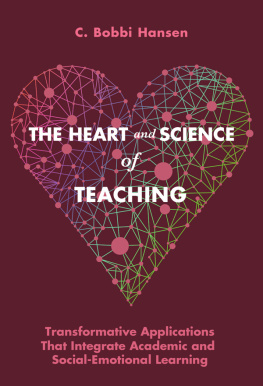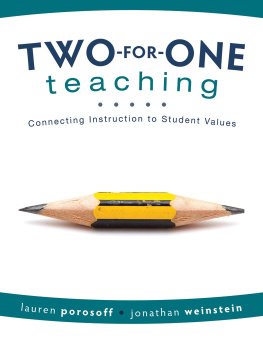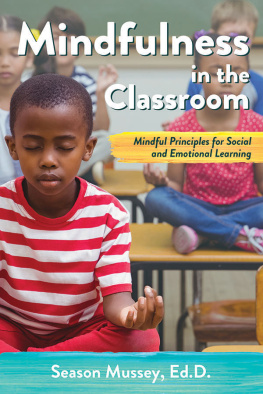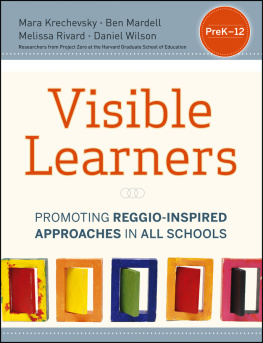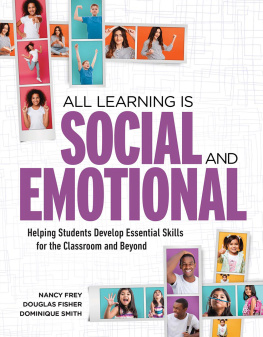The Heart and Science of Teaching
Transformative Applications That Integrate Academic and Social-Emotional Learning
C. BOBBI HANSEN

Published by Teachers College Press, 1234 Amsterdam Avenue, New York, NY 10027
Copyright 2019 by Teachers College, Columbia University
Cover art and design by Jeremy Fink.
All rights reserved. No part of this publication may be reproduced or transmitted in any form or by any means, electronic or mechanical, including photocopy, or any information storage and retrieval system, without permission from the publisher. For reprint permission and other subsidiary rights requests, please contact Teachers College Press, Rights Dept.:
Library of Congress Cataloging-in-Publication Data
Names: Hansen, C. Bobbi, author.
Title: The heart and science of teaching : powerful applications to link academic and social-emotional learning, K12 / C. Bobbi Hansen.
Description: New York, NY : Teachers College Press, [2019] | Includes bibliographical references and index. |
Identifiers: LCCN 2018038806 (print) | LCCN 2018040359 (ebook) | ISBN 9780807777497 (ebook) | ISBN 9780807759516 (pbk.) | ISBN 9780807777497 (ebk.)
Subjects: LCSH: Affective education. | Social learning. | Academic achievementPsychological aspects. | Emotions and cognition. | Student teachersTraining of.
Classification: LCC LB1072 (ebook) | LCC LB1072 H38 2019 (print) | DDC 370.15/34dc23
LC record available at https://lccn.loc.gov/2018038806
ISBN 978-0-8077-5951-6 (paper)
ISBN 978-0-8077-7749-7 (ebook)
This book is dedicated to my love, David, who is extraordinary and the Heart of my life! Without your inspiration, this book would never have come to be.
And, to my two children, Randy and Holly, from whom I have learned so much as I watched you grow into amazing, heart-centered humans!
And, to my sister, Karin, with whom I share magical genes!
You all light up my life!
Contents
Acknowledgements
I am grateful to all who helped bring this book to life.
This includes the very fine staff at Teachers College Press, beginning with Regina Ward, consulting senior acquisitions editor. I am supremely grateful for her perceptions and support of my vision for this book; she is a pleasure to work with and a constant source of optimism. Also I thank Lori Tate, senior production editor, whose professionalism and leadership helped oversee and guide the book to the final stages, and Kathy Caveney, who copyedited the manuscript and whose astute, meticulous eye helped get the text in the form needed for publication. And to all others who assisted in the process, know that I very much appreciate the integral role you played in the production of this book.
Next, I would like to acknowledge the dozens of researchers and writers whose work has been mentioned in this book. Thank you for the wisdom you have shared with us all on your own educational journey.
I would next like to acknowledge David, my love and life partner. You inspired me to pursue my dream (and also to write simply and from the heart). Excellent advice, indeed.
Finally, thank you to all the students I have ever taught. May you all know that you have taught me more about teaching than any book I could have read.
Introduction
In the field of education, the phrase art and science of teaching is quite familiar. Over the last 4 decades there have been many books and articles written with variations of that title (e.g., Caputi, 2010; Elton, 2007; Galbraith & Jones, 2006; Giordano, 1975; Marzano, 2007). In each of these the act of teaching has been examined through the joint lenses of science and natural ability. That is, researchers have investigated what effective teachers do and also the inborn talent, or natural artistry, a teacher brings to the classroom. The question posed is usually something like this: Are good teachers born or made? This book is both similar to and different from these others. It is similar in that there is an emerging science of teaching that points to particular evidence-based teaching practices that have been found to strongly affect student learning. It is also different because the analogy of teacher-as-artist is no longer justifiable for the 21st century. There now exists an abundance of scientific evidence to support relationship-based teachings positive effect on academic achievement. This research is not well-known to the average educatorand it needs to be! Not since Aspy and Roebucks (1977) best-selling and heavily cited book Kids Dont Learn from People They Dont Like has there been such a concerted effort to attend to the overwhelming body of evidence that has clearly revealed that an emotionally supportive classroom environment makes a positive difference in student learning. This difference is achieved by a teachers unflinching commitment to addressing critical socialemotional factors in the classroom.
The pages you are about to read blend the latest research in education, neuroscience, and cognitive psychology into a dynamic and vibrant ensemble that explores the multidimensional connections between evidence-based instructional strategies and the essential socialemotional factors that enhance learning for all students.
EVIDENCE-BASED INSTRUCTION
In 2001 the No Child Left Behind Act (NCLB) was implemented in the United States. The major focus of NCLB was to close student achievement gaps by providing all children with a fair, equal, and significant opportunity to obtain a high-quality education. The four components of the legislation were: accountability, flexibility, parent options, and research-based education. This last area, research-based education, served as a wake-up call as there was a growing consensus among educators and legislators that bringing scientifically based research into our classrooms was long overdue. Under NCLB, the term scientifically based research referred to research that involved the application of rigorous, systematic, and objective procedures to obtain reliable and valid knowledge relevant to education activities and programs (No Child Left Behind Act [NCLB], 2001).
This revolution in educational practices that began in the early part of the 21st century might be compared to what happened in medicine almost a century ago. When the great influenza, commonly known as the flu of 1918, broke out in the United States, Johns Hopkins University turned the existing medical model upside down by insisting that only proven medicine be practiced, medicine that was based on the scientific method of research.
Similarly, in education the decade that followed the passage of NCLB witnessed unparalleled activity in universities and research centers throughout the United States intent on identifying exactly which classroom and teaching practices were deemed to be most effective. In classrooms all over the nation we are currently seeing the results of those effortsprograms and teaching practices that are predicated on scientifically based research. Robert Slavin, Director of the Center for Research and Reform in Education at Johns Hopkins University, makes this assertion regarding the use of evidence-based teaching strategies:
The consequences of this shift to evidence-based reform will be profound immediately and even more profound over time, as larger numbers of schools and districts come to embrace evidence-based reform and as more proven programs are created and disseminated. (Slavin, 2014, p. 1)

